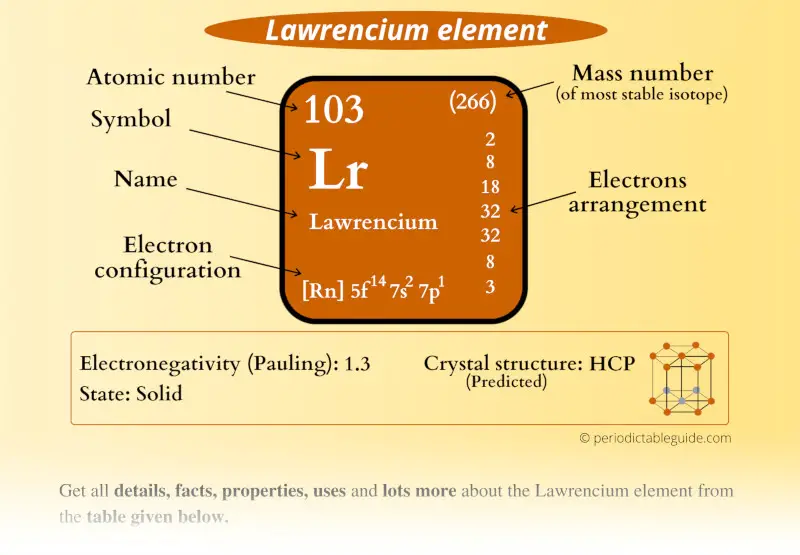
This is a SUPER easy guide on Lawrencium element.
In fact, the table mentioned below is the perfect information box (Which gives you every single detail about the Lawrencium element in Periodic table.)
So if you want to know anything about the Lawrencium element, then this guide is for you.
Let’s finish this very quickly.
Lawrencium Element (Lr) Information
| State (at STP) | Solid (predicted) |
| Position in Periodic table | 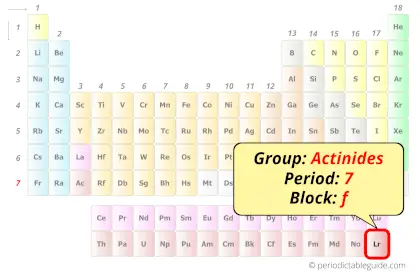 Group: actinides, Period: 7, Block: f |
| Category | 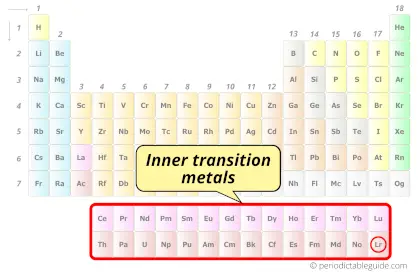 Inner transition metals |
| Atomic number or Protons | 103 |
| Neutrons | 159 |
| Electrons | 103 |
| Symbol | Lr |
| Atomic mass of Lawrencium (most stable isotope) | 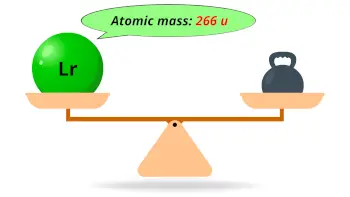 266 u |
| Electrons arrangement or Bohr model | 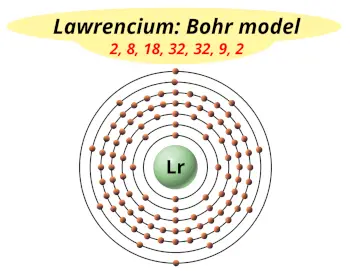 2, 8, 18, 32, 32, 9, 2 |
| Electronic configuration | [Rn] 5f14 7s2 7p1 |
| Electronegativity | 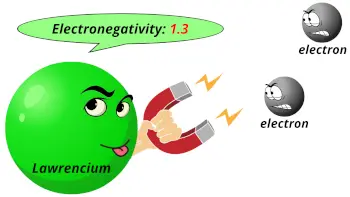 1.3 (Pauling scale) |
| Crystal structure (predicted) | 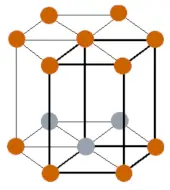 HCP (hexagonal close packed) |
| Melting point (predicted) | 1900 K or 1627 °C or 2961 °F |
| Density (predicted) | 14.4 g/cm3 |
| Main isotope | 262Lr |
| CAS number | 22537-19-5 |
Lawrencium in Periodic table
Lawrencium element is in period 7 and in actinides group of the Periodic table. Lawrencium is the f-block element and it belongs to inner transition metals group.
| H | He | ||||||||||||||||
| Li | Be | B | C | N | O | F | Ne | ||||||||||
| Na | Mg | Al | Si | P | S | Cl | Ar | ||||||||||
| K | Ca | Sc | Ti | V | Cr | Mn | Fe | Co | Ni | Cu | Zn | Ga | Ge | As | Se | Br | Kr |
| Rb | Sr | Y | Zr | Nb | Mo | Tc | Ru | Rh | Pd | Ag | Cd | In | Sn | Sb | Te | I | Xe |
| Cs | Ba | La* | Hf | Ta | W | Re | Os | Ir | Pt | Au | Hg | Tl | Pb | Bi | Po | At | Rn |
| Fr | Ra | Ac** | Rf | Db | Sg | Bh | Hs | Mt | Ds | Rg | Cn | Nh | Fl | Mc | Lv | Ts | Og |
| *Ce | Pr | Nd | Pm | Sm | Eu | Gd | Tb | Dy | Ho | Er | Tm | Yb | Lu | ||||
| **Th | Pa | U | Np | Pu | Am | Cm | Bk | Cf | Es | Fm | Md | No | Lr |
←Move to: Nobelium (No) element – Periodic Table
→Move to: Rutherfordium (Rf) element – Periodic Table
Why is Lawrencium in Period 7?
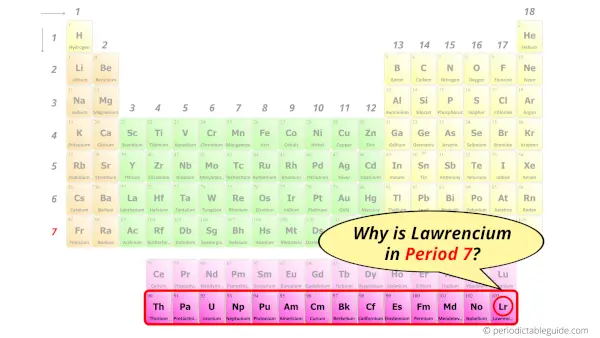
Let me ask you a question.
How many shells does lawrencium have?
It’s 7. Right?
You have already seen the bohr model of lawrencium atom in the above table.
From the Bohr model, it can be found that the number of orbits or shells in lawrencium is 7. Hence, as lawrencium has 7 orbits, it lies in period 7 of the Periodic table.
Why is Lawrencium in f-block?
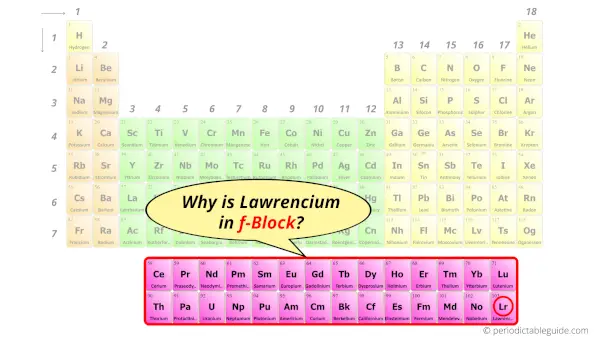
Before knowing this reason, first of all I want to ask you a simple question.
How can you determine the blocks-wise position of elements?
The simple answer: The elements will lie in the s, p, d or f block will completely depend upon the subshell in which the last electron will enter.
For example; the electron configuration of lawrencium is [Rn] 5f14 7s2 7p1.
So the last electron of lawrencium enters the f-subshell or f-orbital.
Hence, lawrencium is the f-block element.
5 facts about Lawrencium
Interesting facts about lawrencium element are mentioned below.
- The element was named “Lawrencium” to honor the chemist Ernst Lawrence.
- Lawrencium was discovered by Georgy Flerov and his colleagues at Joint Institute of National Research and this element was also independently discovered by Albert Ghiorso and his colleagues at Lawrence Berkeley National Laboratory.
- There are 14 isotopes of lawrencium and all these isotopes are radioactive in nature.
- Out of all the isotopes of lawrencium, the most stable isotope is 266Lr, which has a half-life of 10 hours.
- Lawrencium is a synthetic element and it is prepared artificially by humans. Till now, very less quantity of lawrencium has been produced.
Properties of Lawrencium
The physical and chemical properties of lawrencium element are mentioned below.
- Lawrencium is a radioactive element and it is harmful too.
- Just similar to the other actinides, the lawrencium element also shows the +3 and +2 oxidation states.
- The predicted melting point of lawrencium is 1627 °C.
- The atomic mass of the most stable isotope of lawrencium is 266 u and its predicted density is 14.4 g/cm3.
- The predicted crystal structure of lawrencium is HCP (hexagonal close packed).
Uses of Lawrencium
Lawrencium is generally used for scientific research work. It has no commercial uses due to its radioactive nature as well as scarcity.
Explore our New Interactive Periodic Table (with Rotating Bohr Models and More)
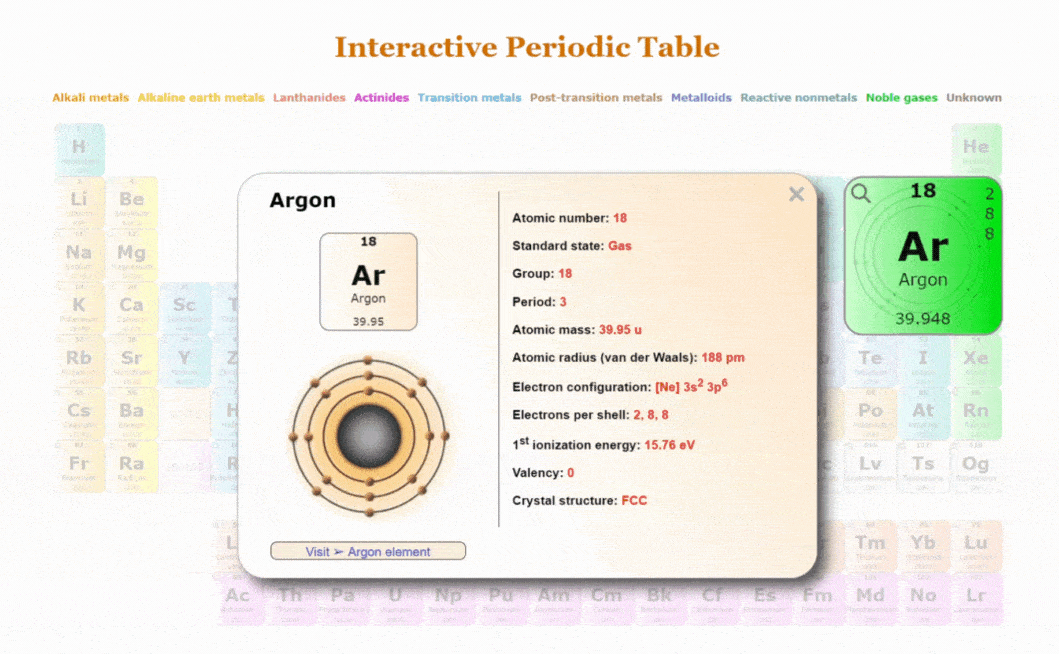
Details about this Periodic table:
- Access detailed info on all elements: atomic mass, electron configurations, charges, and more.
- View rotating Bohr models for all 118 elements.
- Get a free HD image of the Periodic Table.
Note: For future use, bookmark this Periodic table or visit “PeriodicTableGuide.com”
External resources:
- Lawrencium – Element information, properties and uses | Periodic Table. (n.d.). Lawrencium – Element Information, Properties and Uses | Periodic Table. https://www.rsc.org/periodic-table/element/103/lawrencium
- Lawrencium – Wikipedia. (2020, March 15). Lawrencium – Wikipedia. https://en.wikipedia.org/wiki/Lawrencium
- P. (n.d.). Lawrencium | Lr (Element) – PubChem. Lawrencium | Lr (Element) – PubChem. https://pubchem.ncbi.nlm.nih.gov/element/Lawrencium
- It’s Elemental – The Element Lawrencium. (n.d.). It’s Elemental – the Element Lawrencium. https://education.jlab.org/itselemental/ele103.html
- Lawrencium | CCDC. (n.d.). Lawrencium | CCDC. https://www.ccdc.cam.ac.uk/elements/lawrencium/
- Periodic Table of Elements: Los Alamos National Laboratory. (n.d.). Periodic Table of Elements: Los Alamos National Laboratory. https://periodic.lanl.gov/103.shtml
- Nagame, Y. (2016, February 19). Lawrencium’s place at the table. Nature Chemistry, 8(3), 282–282. https://doi.org/10.1038/nchem.2460
- Henderson, R. A. (2018, July 5). Chemical and nuclear properties of lawrencium (element 103) and hahnium (element 105). Chemical and Nuclear Properties of Lawrencium (Element 103) and Hahnium (Element 105) – UNT Digital Library. https://doi.org/10.2172/6362919
- Lawrencium experiment could shake up periodic table. (2015, April 8). Lawrencium Experiment Could Shake up Periodic Table | Research | Chemistry World. https://www.chemistryworld.com/news/lawrencium-experiment-could-shake-up-periodic-table/8438.article
